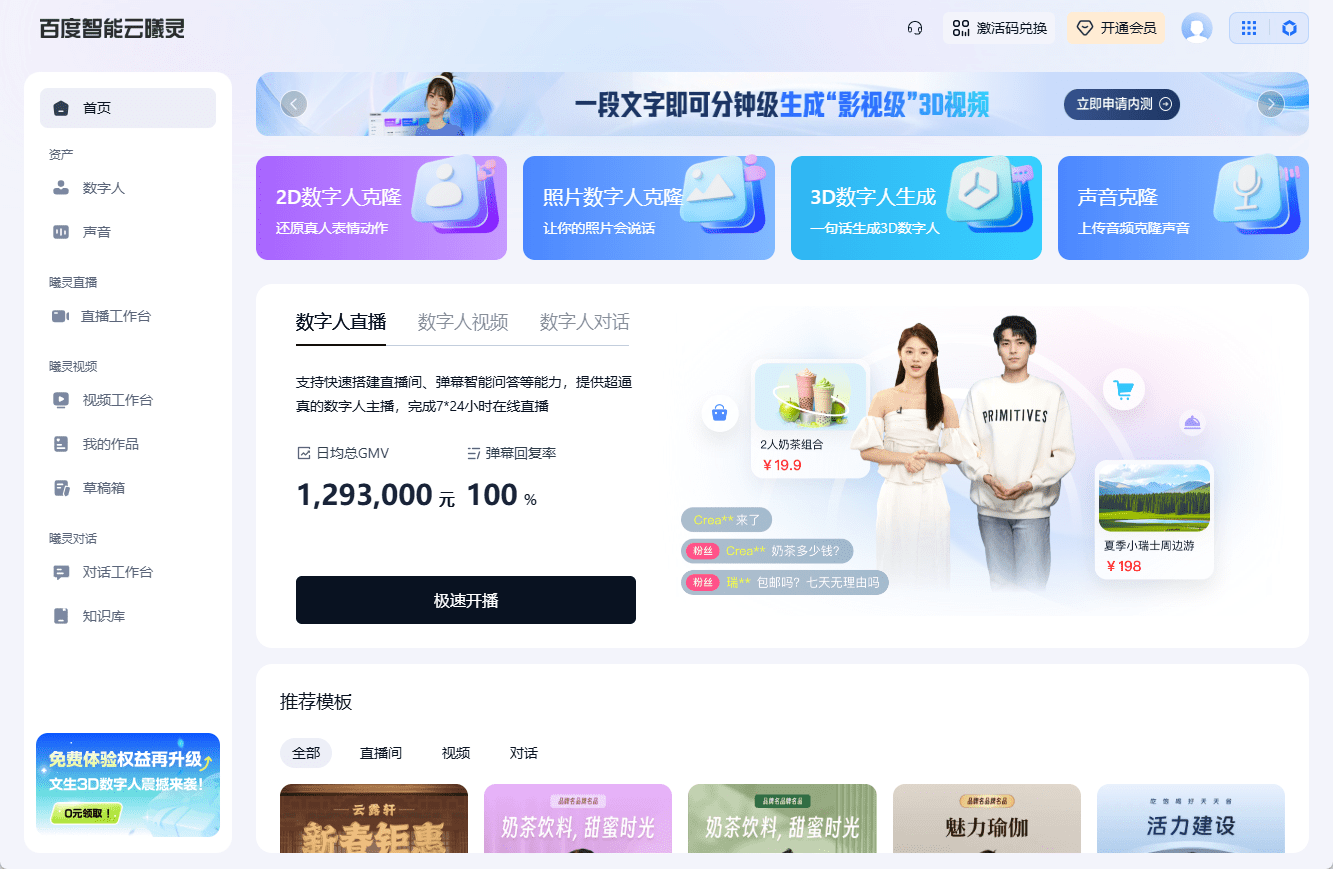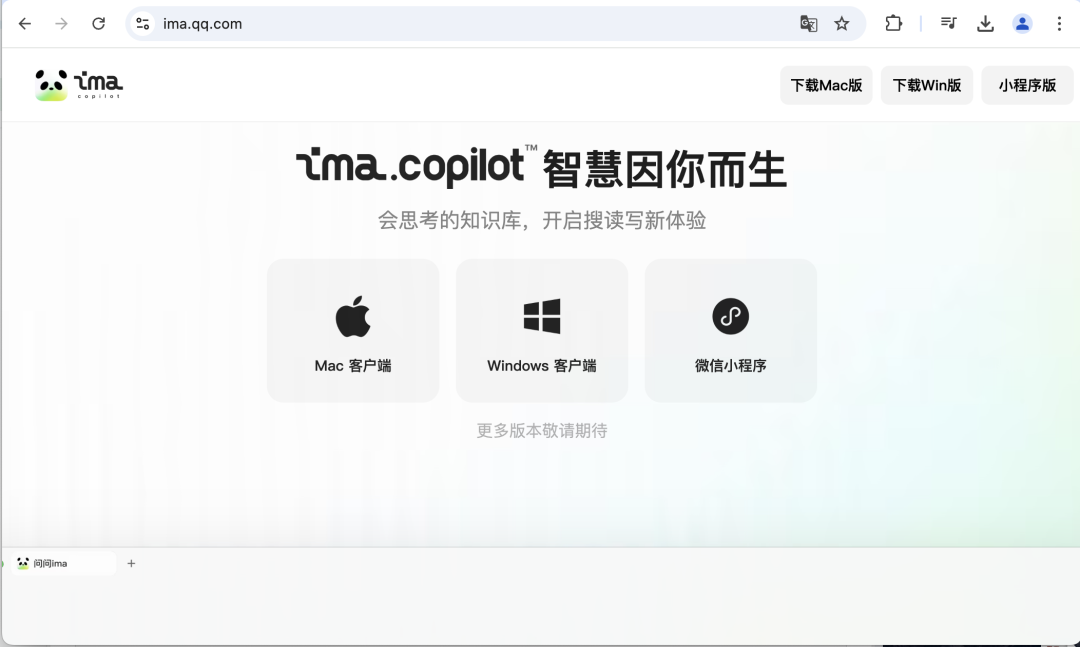Interpretation of Coze Space: byte jump layout AI Agent, targeting "zero threshold" office assistant
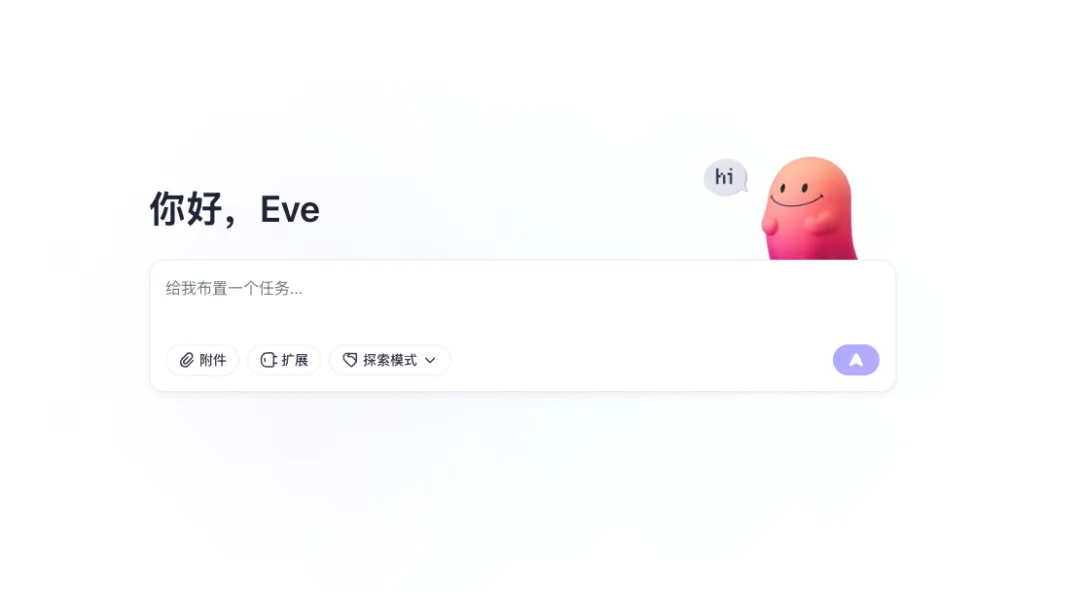
ByteDance enters the picture: can Coze Space define a new paradigm of coworking with AI Agents?
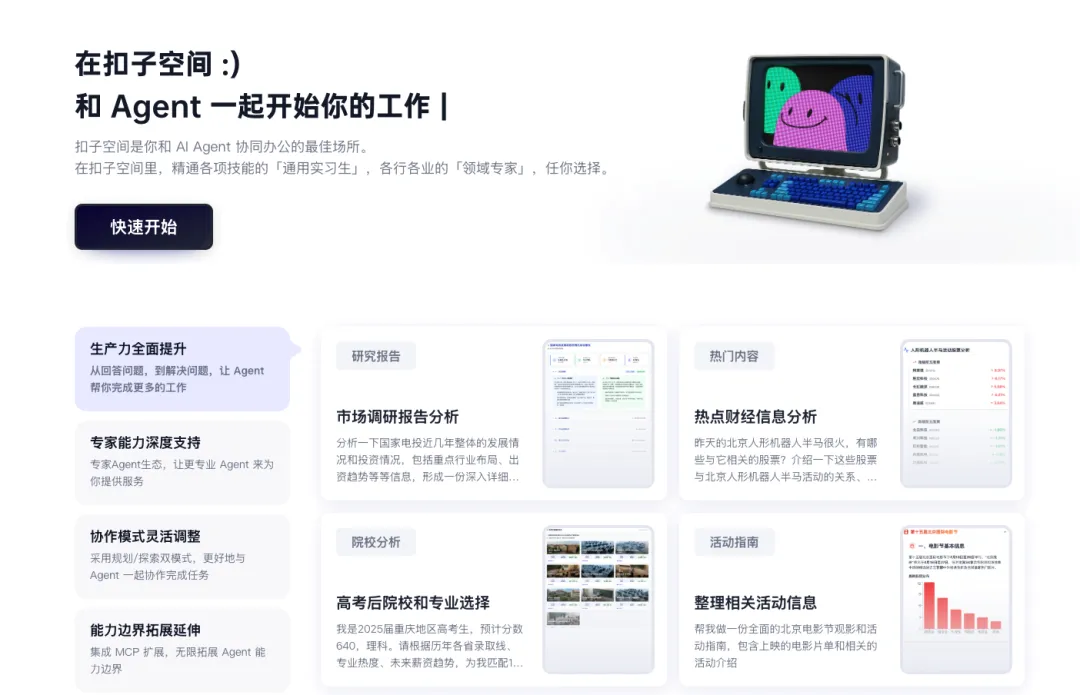
Recently, ByteDance's AI Agent development platform Coze Coze Space (space.coze.cn) has quietly launched the internal testing of a new feature. The platform is positioned as "the best place to work with AI Agents", aiming to improve the efficiency of users in handling complex tasks through the integration of large-scale modeling capabilities, automation tools and an open ecosystem, so as to realize the automation of the whole process from demand input to result output. This move marks an important step for ByteDance in the field of general-purpose AI Agents, attempting to explore the in-depth application of AI in practical work scenarios.
Coze Space's core competencies are reflected in several areas:
firstly Intelligent Task Decomposition and Execution. The platform claims to be able to parse the natural language requirements inputted by the user and break them down into specific subtasks after recognizing the intent. Subsequently, the system will automatically invoke tools such as browsers and code editors for execution, and transparently display the thinking and execution steps to the user, seeking confirmation from the user at the right time during the process to ensure the accuracy of the task direction. This human-computer collaboration model is a key direction in the current development of AI Agents, aiming to balance automation efficiency and user control.
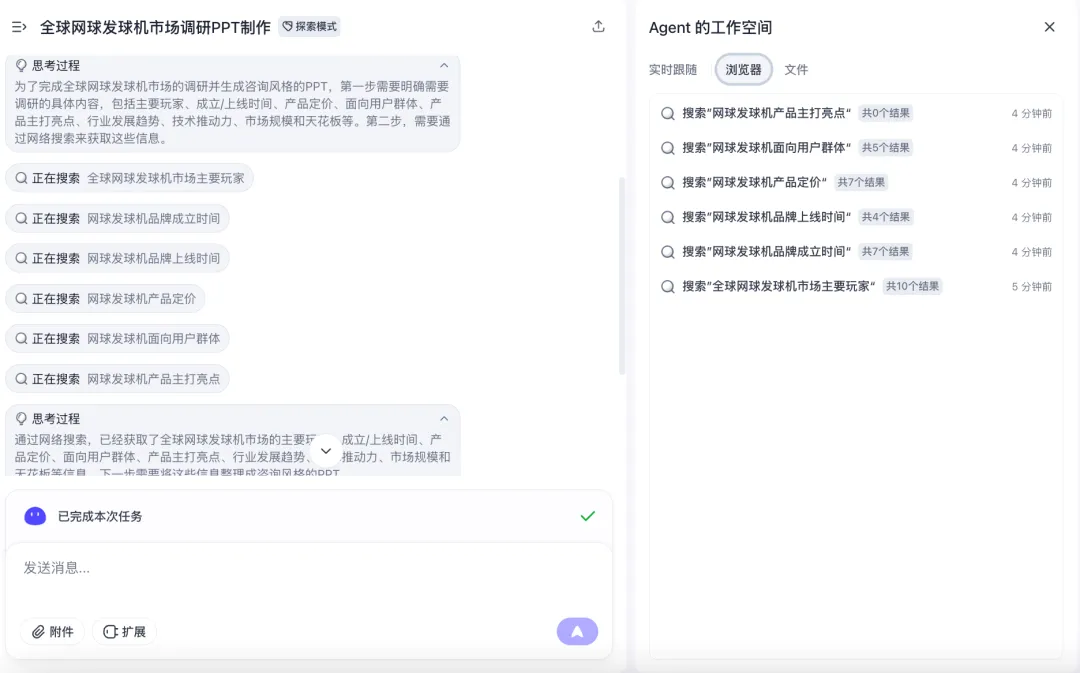
Secondly, the platform provides Two working models: "exploratory model" and "planning model"The "exploration mode" was described as focusing on rapid response for time-sensitive tasks, while the "planning mode" was used for more in-depth thinking and planning for more complex projects. According to the introduction, the "exploration mode" focuses on rapid response and is suitable for tasks with high timeliness requirements, while the "planning mode" carries out more in-depth thinking and planning and is used to deal with projects with a higher degree of complexity. This design tries to meet the needs of different task scenarios, but the specific differences between the two modes in terms of underlying logic and actual results have yet to be verified by more public information and user feedback.
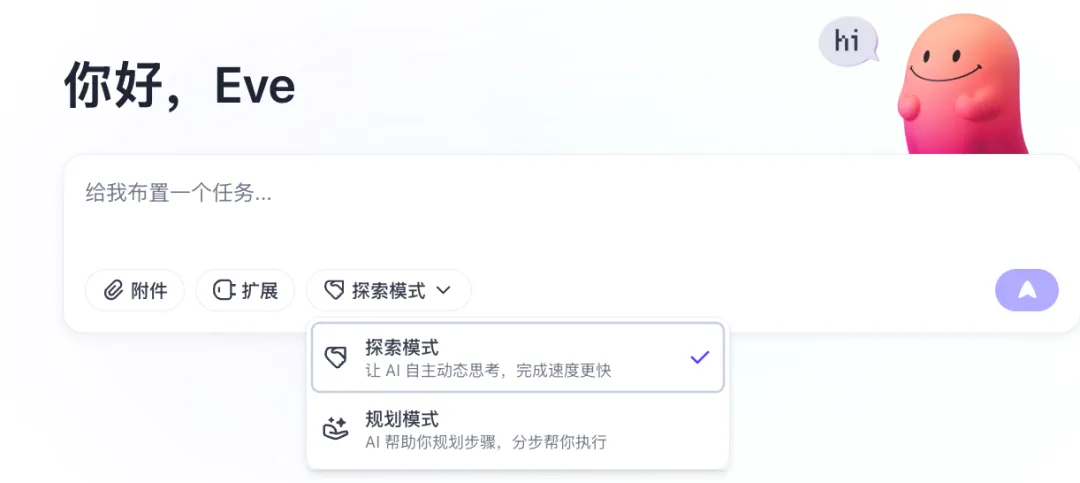
Furthermore, Coze Space emphasizes its Rich plugin support and built-in extensionsIt inherits the plugin ecosystem of the Coze platform. It inherits the plugin ecosystem of Coze platform and integrates more than 60 plugins covering information, travel, office and other fields. What's more noteworthy is that Coze Space has built a generic extension called MCP (which may refer to Message Control Protocol or similar plugin/extension mechanism) into the main Agent. This means that the system can intelligently select and invoke third-party services such as Flying Book Multi-Dimensional Forms, Gaode Maps, InkWeather, Notion, etc. when performing tasks. The platform is also planned to allow users to integrate the MCP released to Coze Space, which heralds a more open and connected ecosystem of AI applications. This ability to deeply integrate third-party services is an important indicator of the utility of the AI Agent.
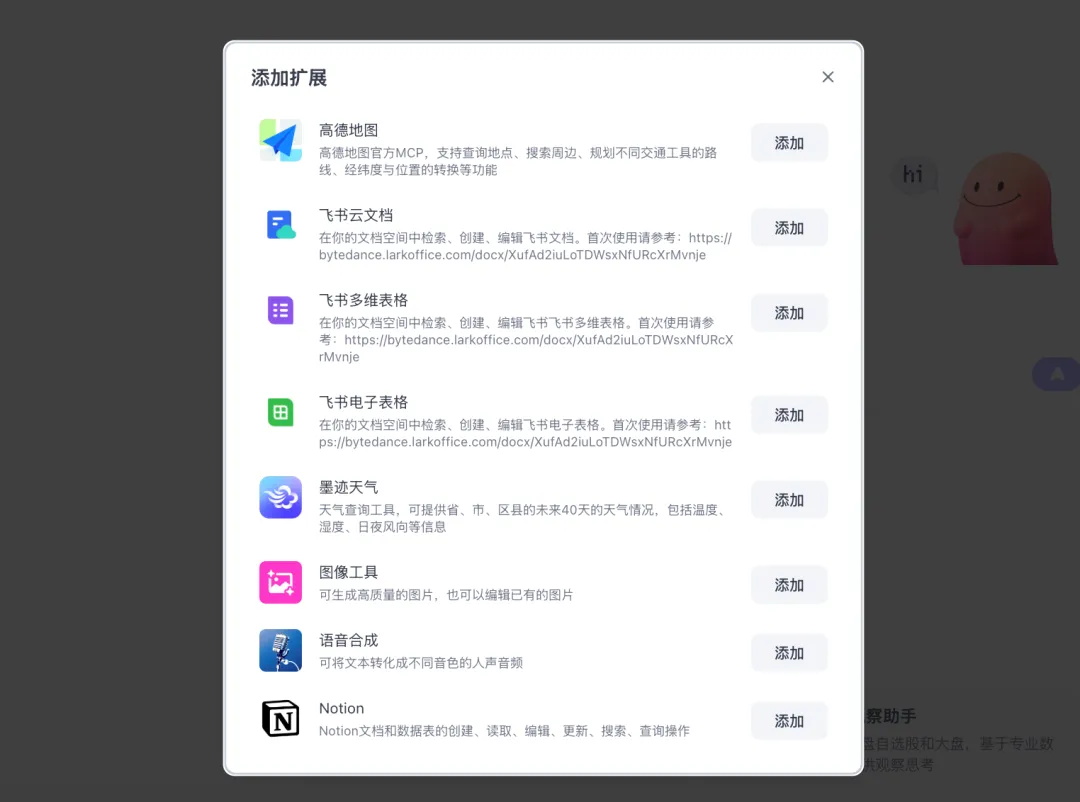
Initial Experience and Competency Assessment of Coze Space
According to early user testing feedback, Coze Space performs smoothly in terms of user experience, continuing the Coze platform's clean design style and relatively stable engineering implementation. Especially in terms of task disassembly speed and execution stability, the initial impression is positive, with less obvious lag.
Research and Content Generation Scenarios
During the test, Coze Space was instructed to research the niche "Tennis Tee" and generate a PPT.
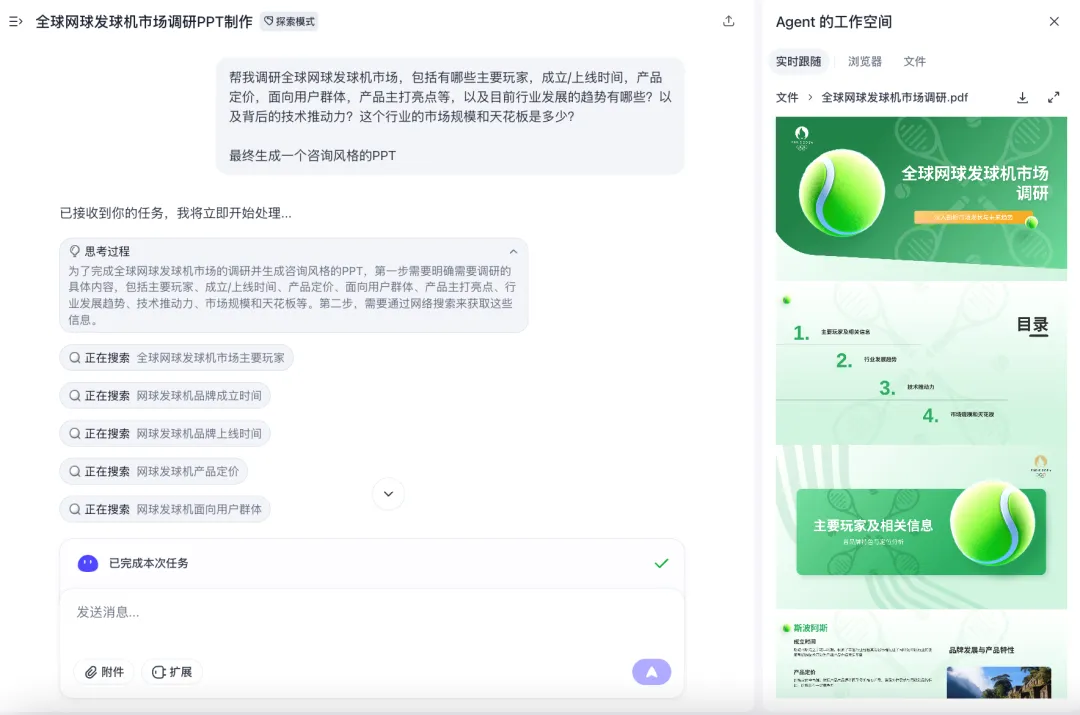
In less than three minutes, the platform reportedly generated a 23-page PowerPoint presentation in a format that could be downloaded and then edited. The structure of the document was generally clear and covered the main points of the research requested by the user. This demonstrates its potential for information retrieval, integration and initial content creation.
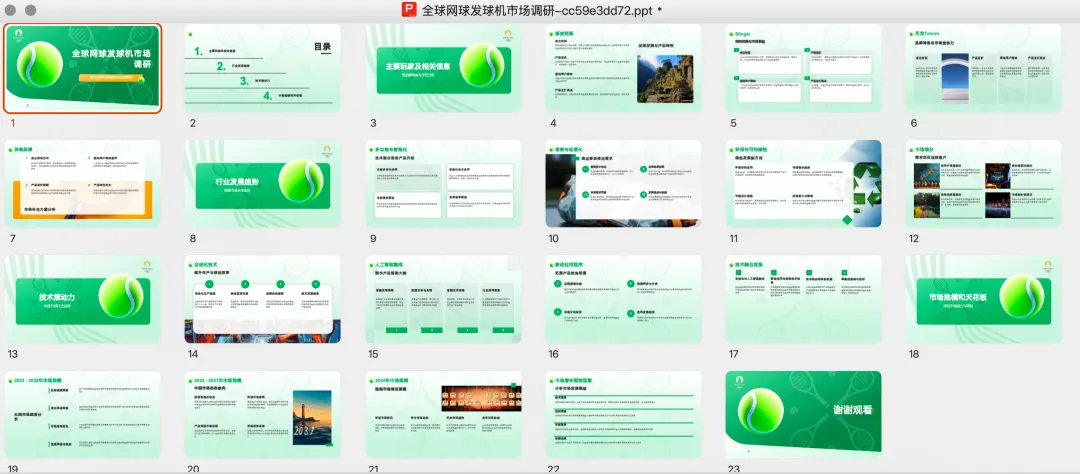
Data visualization is another test scenario. Enter a link to the webpage "Statistical Bulletin of National Economic and Social Development 2024" and ask Coze Space to generate a visualization report.
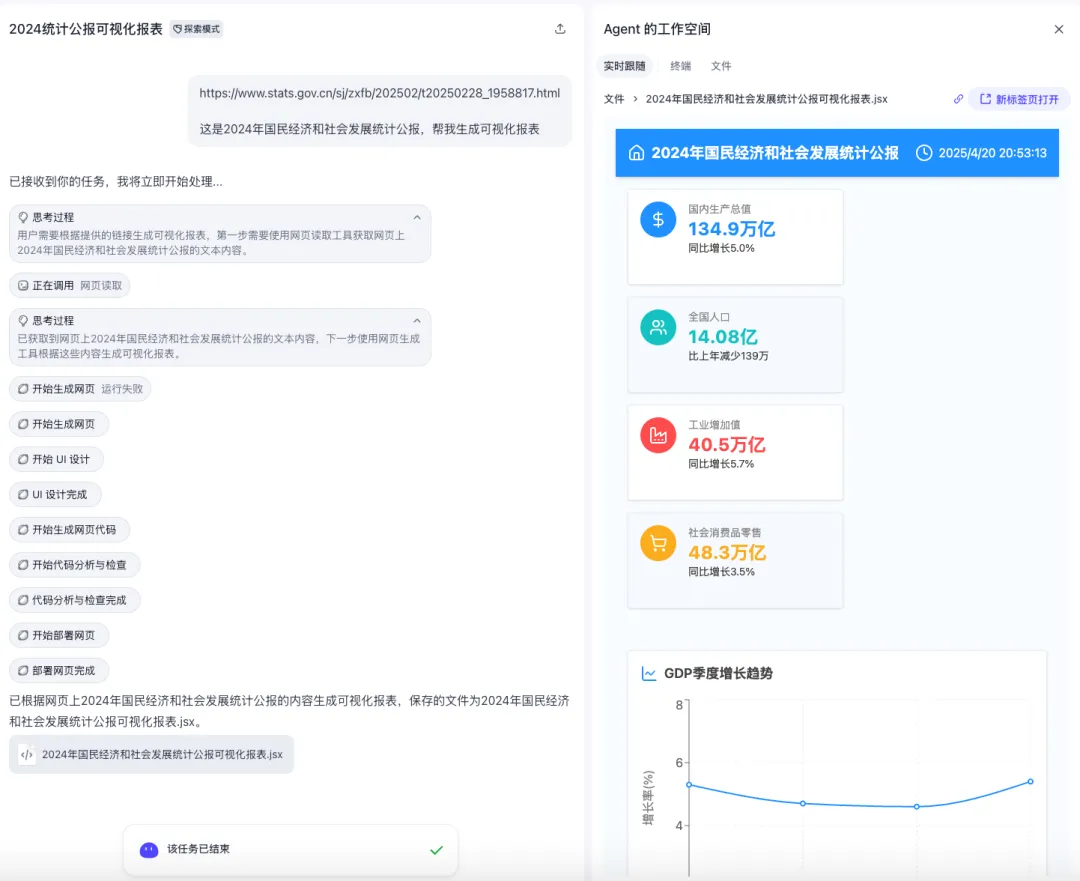
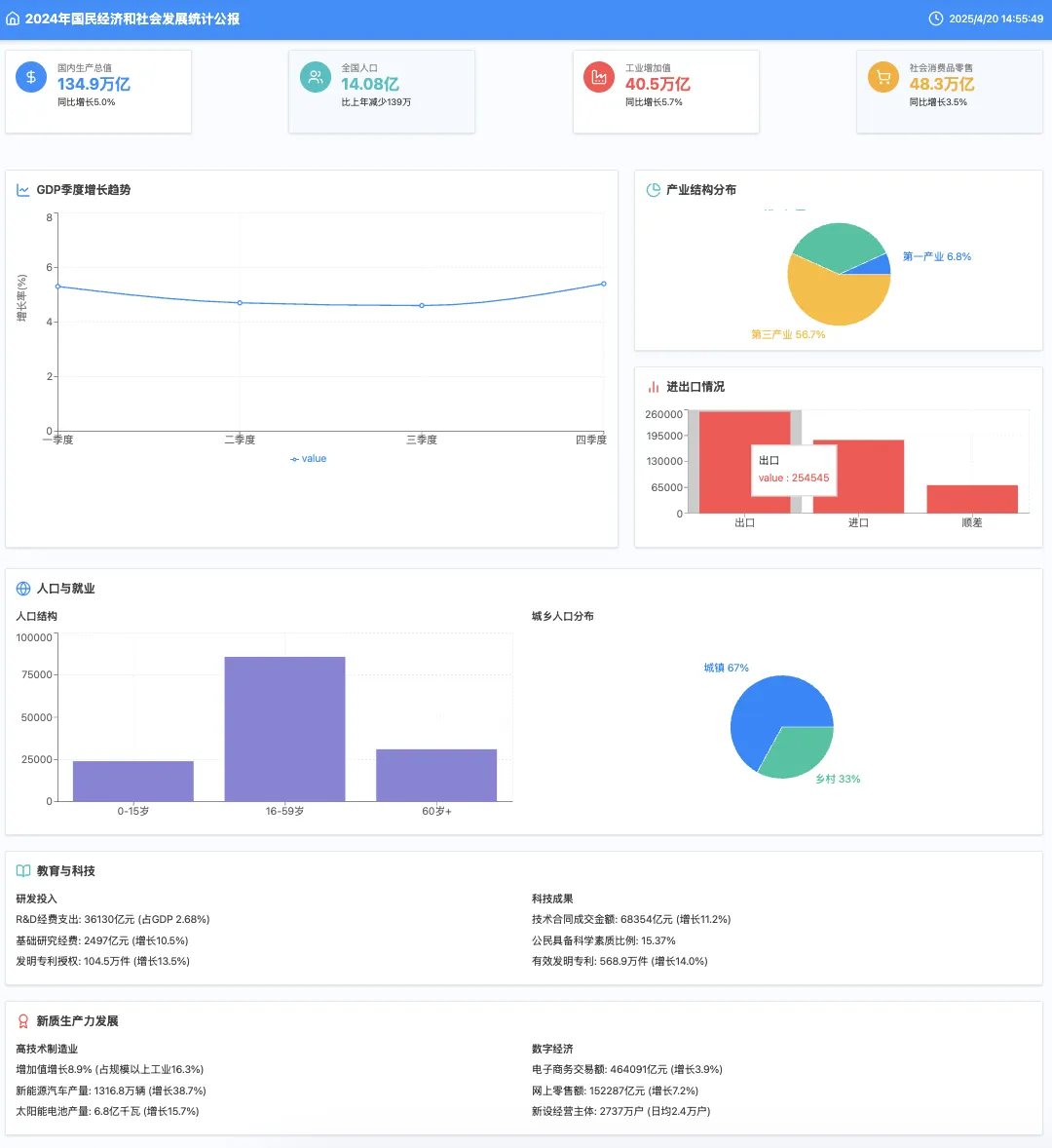
From the results, Coze Space is able to extract key data and generate charts, which is of practical value to users who need to process and present data information quickly.
Interactive Web Page Generation
Coze Space also tries to dabble in lightweight development tasks, such as the rapid implementation of a simple web application idea (similar to so-called "Vibe coding" or low code/no code development). The test instruction was to generate a Japanese Isuzu map mnemonic application that required each kana to be associated with a unique visual symbol and scene story.
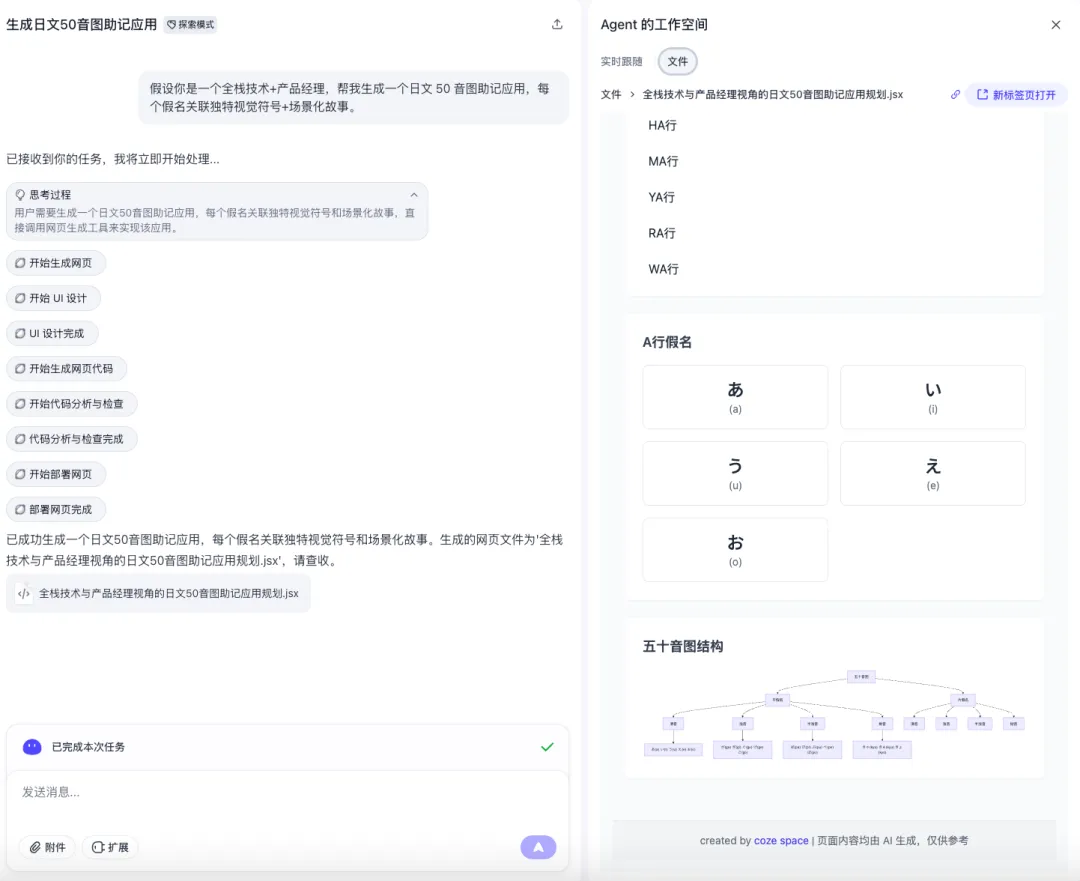
According to feedback, Coze Space completed requirements understanding, UI conceptualization, code generation, checking and deployment in a few minutes. The generated application content met expectations in terms of creativity and relevance, demonstrating the possibilities of AI Agent for rapid prototyping.
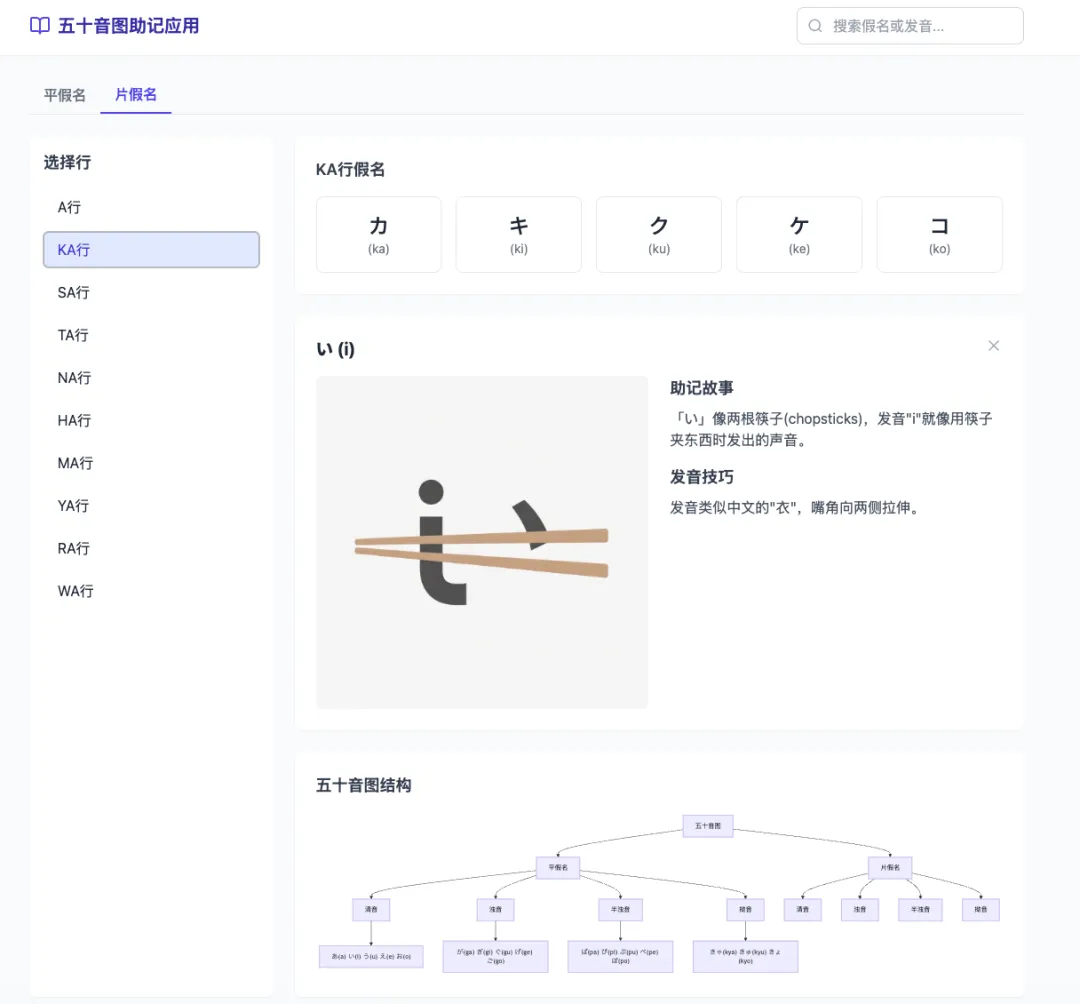
Complex mission planning: travel itinerary customization
A more complex test was to customize a Spanish honeymoon travel plan with specific dates, budget, points of interest (flamenco, wine tasting, historic architecture), special needs (recommendations for hidden surprise locations), and a request to generate an HTML travel brochure with maps, descriptions of attractions, common phrases, and tips.
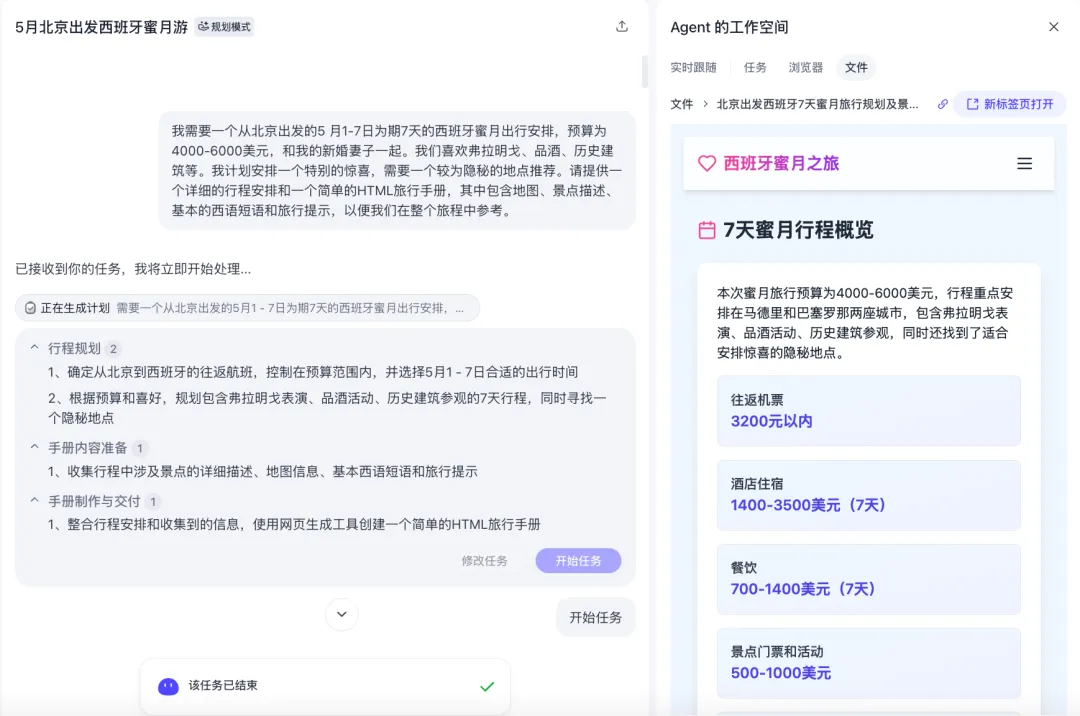
The task took about 50 minutes, during which Coze Space searched nearly 100 web pages. The resulting plan was detailed and well-structured. However, the test also revealed some problems, for example, the integration of AutoNavi Maps was not successfully displayed. This suggests that although the AI Agent's capabilities are improving, stability and reliability are still challenges when dealing with complex tasks involving multiple service calls and high real-time requirements.
"Expert" services in specific areas
In addition to general-purpose tasks, Coze Space also has pre-built field-specific Expert Agents, such as the "User Research Expert" and the "A-Share Observation Assistant" co-created with Huatai Securities.
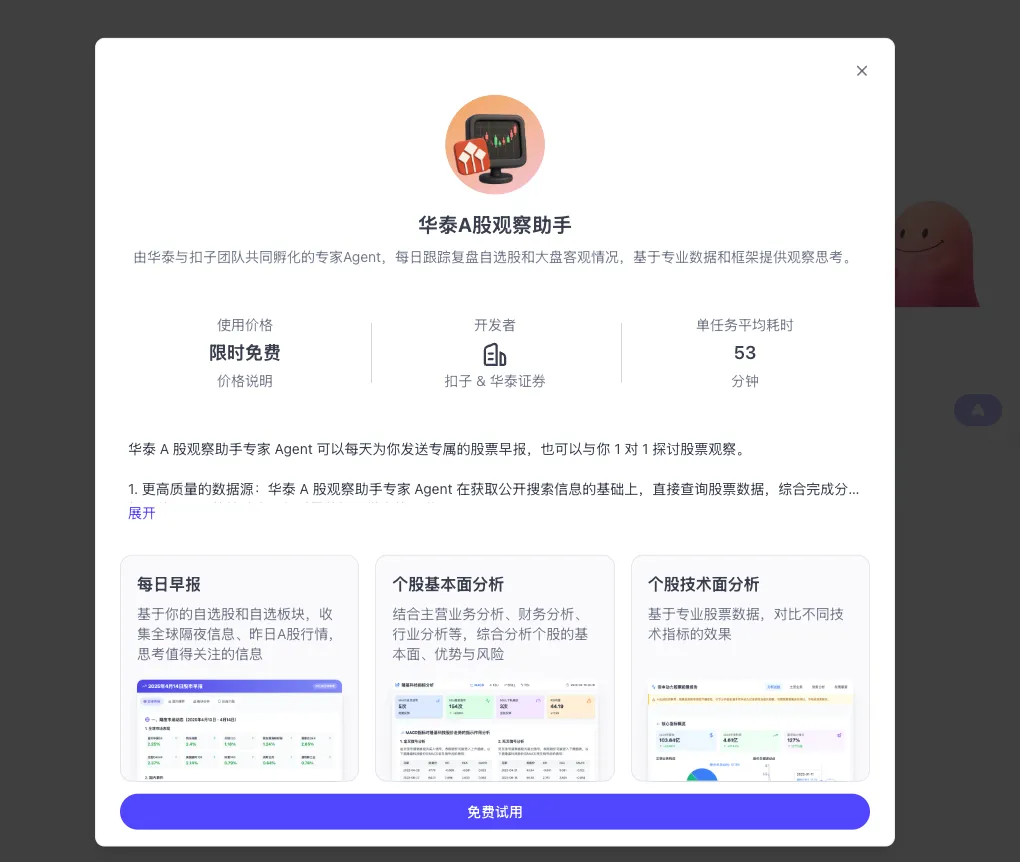
According to the official description, the "A-Share Watch Assistant" can directly query stock databases (instead of relying only on public searches), use Python to analyze technical indicators and data, and conduct research based on a wide range of continuous data. In the test, it was asked to analyze the stock outlook for CSI and create a chart. coze space first planned the steps and sought confirmation from users.
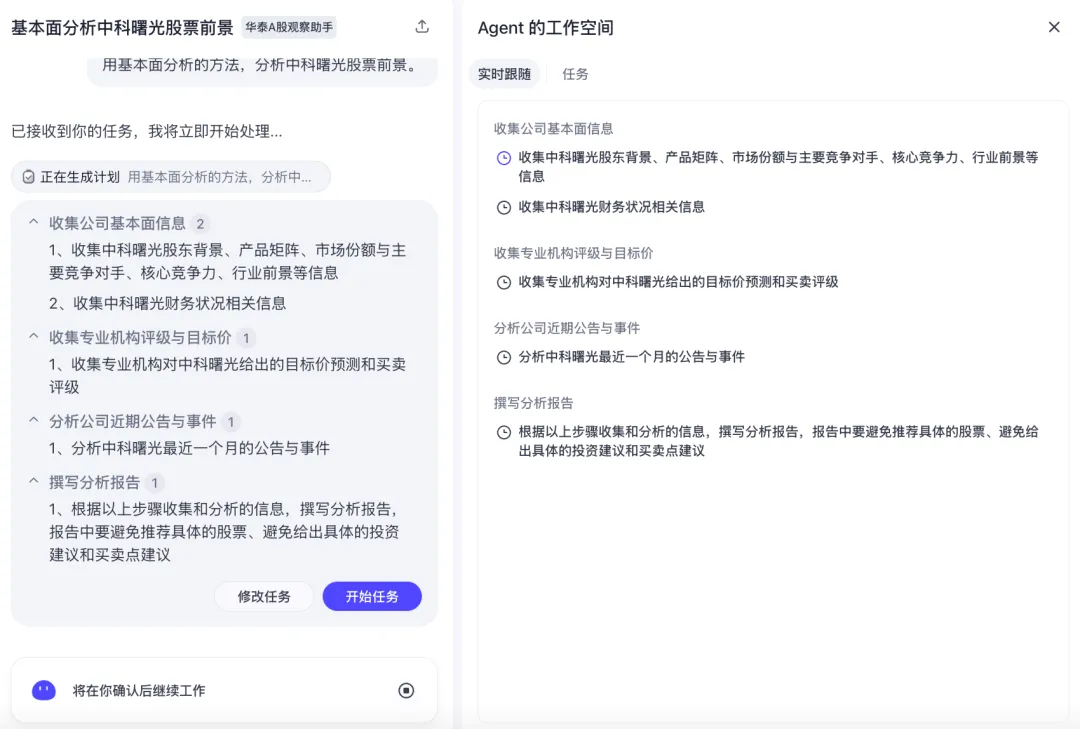
During the implementation process, the platform places special emphasis on obtaining data from specialized financial media and statutory disclosures, focusing on the authority of the information sources.

The task took about half an hour with a long waiting time. The generated results contained information such as corporate fundamentals, financial data charts and agency ratings, and were visualized and presented, which basically achieved the expected results. This demonstrates the potential of AI Agent application in vertical fields, but also highlights that when dealing with specialized and time-sensitive information, users still need to cautiously assess its accuracy and timeliness.
From Developer Tool to Universal AI Assistant: Coze's Evolutionary Path and Market Ambitions
The Coze platform's product iteration trajectory clearly points to one goal:Lowering the barriers to AI adoption, gradually expanding from serving professional developers to general usersThe
This shift has been evident since last October's platform refactoring, when Coze consolidated personal and team spaces, optimized the developer environment, and began offering app templates for non-developers. In March of this year, customizable conversation styles and cross-device usage were added to bring Coze closer to the average user.
While continuing to improve developer tools (e.g., workflows, database functionality) and ecology (e.g., template repository incentives, team collaboration optimization), Coze is also sparing no effort to lower the barrier to use.
Coze Space, the latest beta test, can be seen as a concentrated manifestation of this strategy. It tries to make it easy for users without programming background to complete relatively complex tasks with AI Agent, just like having a "personal assistant". This is not only a lowering of the technical threshold, but also an exploration of AI application forms and interaction methods.
The launch of Coze Space, as well as the overall evolution of the Coze platform behind it, reflects ByteDance's layout in the AI application layer, especially in the Agent direction. Its goal seems to be to create an easy-to-use, powerful and ecologically open platform, so that the ability of AI is truly "universal" to a wider range of user groups, and ultimately realize the "zero threshold" or "low threshold" of AI application development. The ultimate goal is to realize "zero threshold" or "low threshold" for AI application development.
However, the challenge of moving from a developer's tool to a universal application remains. In addition to technical stability and reliability (as shown in the map integration problem), data privacy, information accuracy, and possible future business models are all issues that Coze Space and similar products need to continue to face and solve. The concept of a universal AI Agent is exciting, but whether it can truly become an efficient and reliable productivity tool remains to be tested in the marketplace.
© Copyright notes
Article copyright AI Sharing Circle All, please do not reproduce without permission.
Related posts

No comments...


